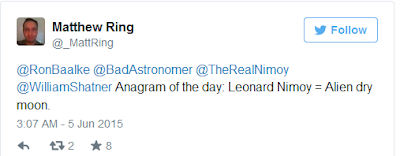I am pleased to learn that actor Leonard Nimoy has been given a singular honor: The asteroid 4864 Nimoy has been named after him.
The asteroid is very roughly 10 km across and is in the main belt between Mars and Jupiter. It orbits the Sun once every 3.9 years.
Its orbit is very slightly elliptical (Spock would no doubt
inform you that it has an eccentricity of 0.1778108147152254, with a
1-sigma uncertainty of 6.3351e-08), and orbits the Sun in almost the
same plane as Earth. It was originally discovered in 1988. In the
orbital diagram above, I chose to display the position of 4864 Nimoy on
the date of his death, Feb. 27, 2015.
In the announcement, a brief statement was made:Discovered 1988 Sept. 2 by H. Debehogne at the European Southern Observatory.
Leonard Nimoy (1931-2015) was an American actor, film director and poet. Best known for his portrayal of the half-Vulcan/half-human science officer Spock in the original "Star Trek" TV series and subsequent movies, Nimoy wrote two autobiographies: I Am Not Spock (1975) and I Am Spock (1995).
Very nice. Amusingly, on Twitter Matthew Ring noted this:
Heh. Ironically, it may not be as dry as all that. At that
location in the asteroid belt there’s some chance of ice inside Nimoy.
And another layer of irony: Some people may think that
Vulcans were incapable of emotion, but in fact they felt emotions even
more strongly than humans; they just kept them more tightly under
control. It wasn’t ice under Spock’s skin, it was barely constrained
lava.
And I have to wonder. Sometime between now and the 23rd century, will we have visited this mountain-sized rock? And in that (hopefully promising) future, will Star Trek still be the inspiration it is for so many today?
I hope so. May its, and Nimoy’s, legacy live long and prosper.
By Phil Plait
With many thanks to Slate.
I hope so. May its, and Nimoy’s, legacy live long and prosper.
By Phil Plait
With many thanks to Slate.


